Cochlear implant enhances adult patient's quality of life
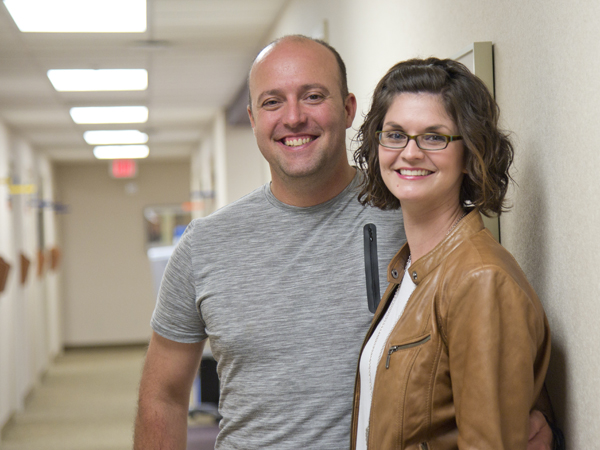
When pondering two of her biggest life decisions, Lindsey Edmondson didn't waste time and didn't look back.
The first: She met husband Brad Edmondson in February 2003 when they were students at East Central Community College, went on a horseback-riding date in March, got engaged in May, and tied the knot in August.
The second: Lindsey, who'd coped with progressive hearing loss since toddlerhood, was evaluated for a left-ear cochlear implant in May 2014 by Dr. Tom Eby, professor of otolaryngology and communicative sciences at the University of Mississippi Medical Center. A whirlwind of tests later, she was able to fast-track the surgery to that July 25.
About a month later, Lindsey and Brad returned to the Medical Center and sat next to Dr. Vicki Gonzalez, chief of audiology and assistant professor of otolaryngology and communicative sciences, as Gonzalez pushed the keys on a computer that turned on the half dollar-sized implant for the first time.
Lindsey went from reading lips with her eyes to reading sounds with her brain.
At age 32, after years of muffled hearing at best, “I could hear the air blowing through the vent,” Lindsey said.
“She said, 'Do y'all hear that?'” remembered Brad, 37, a Mississippi Highway Patrol trooper and National Guard member. “We spent three or four minutes trying to figure out what she was talking about.”
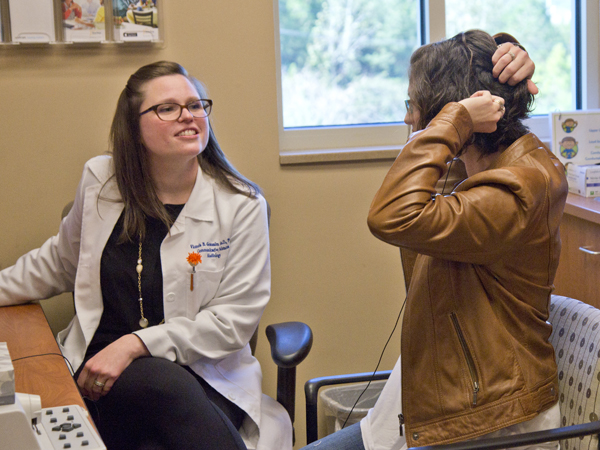
Over the next few months, Lindsey - one of the Medical Center's 205 current adult cochlear implant patients - patiently trained herself to lean on the implant for sound, even when what she heard wasn't her idea of normal. At work as an X-ray technician, she wore her implant in addition to a hearing aid for her right ear.
“As soon as I got home, I forced myself to take out the hearing aid. Your brain needs to learn how to process the sounds,” she said. “There were a lot of frustrating moments. But, it finally clicked.”
As the hearing in her left ear grew from just 7 percent speech understanding to 91 percent today, she heard birds chirping. Her husband driving up in his truck. “Plucking my eyebrows. I can actually hear the clicking,” Lindsey said.
She could hear their two children whisper.
Lindsey's parents didn't know she was losing her hearing until she was 3. “A friend asked them: 'Doesn't she pay attention?' My parents thought I was just hard-headed,” she said.
She immediately began speech therapy. “They didn't want me to learn sign language. They wanted me to read lips,” Lindsey said. And her parents wondered - correctly - if Lindsey's deafness was related to that suffered by her grandfather, who despite his disability was a successful teacher and coach.
Lindsey excelled, reading lips to make up for her limited hearing and refusing to let it define her. It was her disability that, ironically, enamored her to the man who believes she has no limits.
“That's how we got together. She was reading my lips, and I thought she wanted me to give her a kiss,” Brad said. It all began when Lindsey's best friend got Brad to agree to go to Bible study.
“She said she was bringing friends,” he said of Lindsey's friend. “The first person to get out of the car was Lindsey. It was one of those movie moments. I was scared to death that she was in a relationship with someone else.
“She never wore it on her shoulder,” he said of Lindsey's deafness. “When we met, she seemed completely normal. I thought if we got married it would be a plus, because she wouldn't be able to hear me snore. I saw it as a perk, but she could feel the vibration of my snoring every night.”
Lindsey's grandfather received a cochlear implant in 1987, when the device was in its infancy. Lindsey took note and gave it some thought as she grew into an adult.

The big difference between cochlear implants in adults and very young children is that adult candidates are longtime hearing aid users, Eby said. “They've experienced living with hearing loss. The usual story is that, over time, the hearing gets worse and hearing aids are no longer useful.”
He looks for their ability to discriminate words. “Hearing aids help to a point, but there's a cutoff we use for whether hearing aids, or an implant, is the better option. If you can understand 50 percent of words with a hearing aid, you're better off with that. But if it's less, that's not the best option.”
At age 30, after the birth of her two children, Lindsey had an epiphany. She and Brad were living in Columbus due to his job in the National Guard.
“I met a patient in his 50s who had one,” she said. “I was getting frustrated with my communication boundaries. This man said he'd had one for six months, and he didn't know how he'd made it without it.”
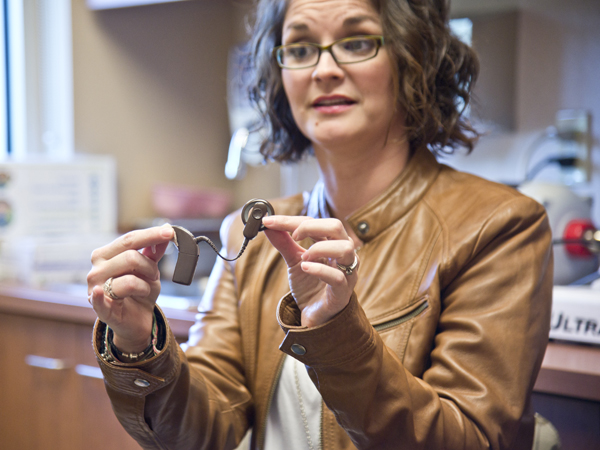
About the time Lindsey decided to pursue the surgery, Brad had a routine health assessment required by the Guard. It included a hearing test. “My audiologist suggested we go to UMMC,” he said.
Lindsey got an appointment with Eby. “I'd been told it would be several months before we'd know if I'd be a candidate. Dr. Eby said I looked like a good candidate, but he needed to follow it through with tests,” Lindsey said. “I said, 'Can we get them all done today?'''
She did -- a hearing evaluation, CT scan and full audiology workup. “God definitely opened all the doors that day,” Lindsey said.
The outpatient surgery comes at a price, but one many profoundly deaf adults are happy to pay. The ear getting the implant generally loses any hearing it previously had. “You're terrified, because you could lose it all. When Lindsey decided to commit, she did it all the way,” said Gonzalez.
An external device that hooks behind Lindsey's ear, much like a hearing aid, is the processor. A wire attached to a magnet aligns the internal device with the external device. “That's what makes it work,” Eby said.
Gonzalez explains to her patients that when she activates their implant, they won't immediately have perfect hearing, or perhaps even a magical moment. “For some people, their expectations going in are too high,” she said. “It's not a fit-and-go. It's a process.
“Some of them think that they have superhuman hearing, and sometimes they say it sounds like Mickey Mouse or a cartoon character,” she said. “For some people, that's more than they've ever had.”
Patients literally must train their brains to interpret the new sounds. “There are some days where patients get frustrated,” Gonzalez said. “But, it will become more and more natural with time.”
And so it's been with Lindsey. “It's so much clearer,” she said. “When I don't have my cochlear implant on and just my hearing aid on, I can hardly hear anything.”
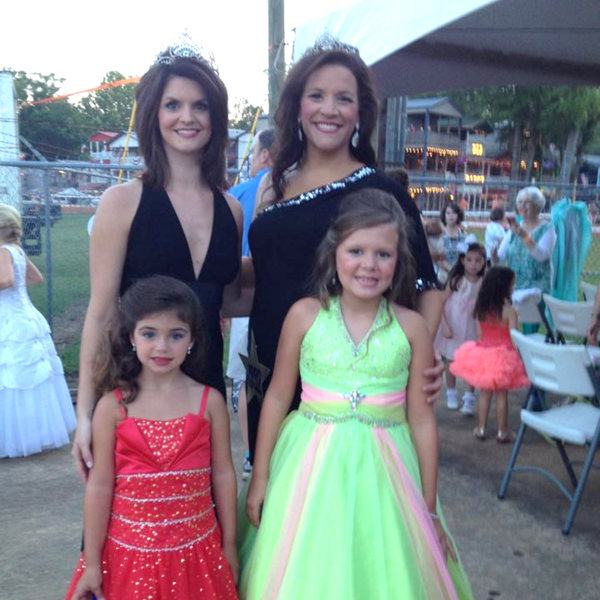
Not exactly following doctors' orders, Lindsey returned to work in a week. The 2001 Miss Neshoba County Fair made it to her reunion of fellow crown-holders just three days after surgery.
Throughout her journey, Brad has been by her side, even if only in spirit. “We were married for seven years before I had six consecutive months at home,” he said. “I was in the middle of a deployment when we got married. She was strong enough, and willing enough, to keep a flawless house through all that. She treated her hearing loss like it was nothing.”
There isn't a hard-and-fast age parameter for adults who have the surgery, Gonzalez said. “I have a patient who is 96 with a cochlear implant, and doing fantastic. Retirees do it for quality of life,” she said.
But many younger patients, like Lindsey, opt for an implant because they want to continue an active lifestyle and be better able to communicate at home and in the workplace. Insurance often covers a good bit, but the procedure and post-op rehabilitation is expensive, costing upward of $40,000, the American Speech-Language Hearing Association estimates.
Hearing loss in adults can be genetic, disease-related or due to noise exposure, Gonzalez said. “It can be caused by meningitis, some infections, or taking toxic chemotherapy drugs.”
Fifty percent of those receiving one implant go on to have the second. That's Lindsey's plan. She understands about 47 percent of speech in her right ear. “I can only imagine how much better it will be. Dr. Gonzalez says likely I'll do better than with the left ear. I'm willing to take that chance,” she said.
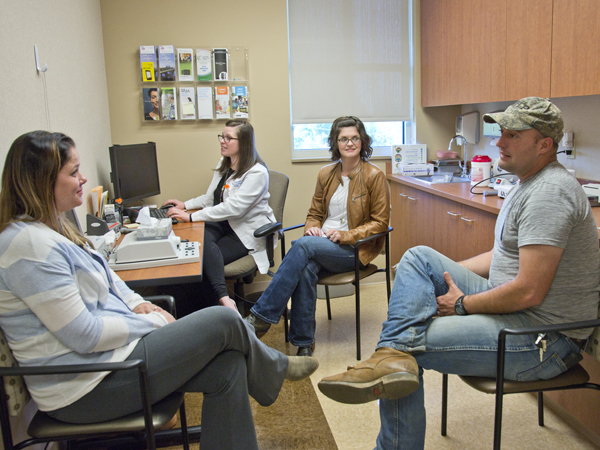
Lindsey said her grandfather did well with his implant at first, but now, “he doesn't wear it except on Sundays for church. He doesn't hear himself. He definitely has communication issues.”
Maximum benefit from an implant “comes more naturally to people who are social,” Eby said. “My elderly women do better than my elderly men because they have their own social circles, and they converse. A lot of my elderly men are very solitary.”
There's a perception, Gonzalez said, that cochlear implants are just for kids. “People don't recognize that they are candidates,” she said. “You don't have to be totally deaf to get a cochlear implant. We have some patients we wish we'd seen 10 years ago.”
Social media is getting out the word, as is patients telling their own stories. “All of a sudden, we have an influx of 20- to 30-year-olds. I have a feeling that's video driven,” Gonzalez said.
Brad puts his life on the line as a state trooper and member of the Guard. “The real hero is her,” he says of his wife.
“The world is a noisy place. I've been frustrated sometimes because there's a lot of sound in a big crowd. But I'm just glad I can hear it,” Lindsey said.
“I want to experience this 100 percent of the time."


